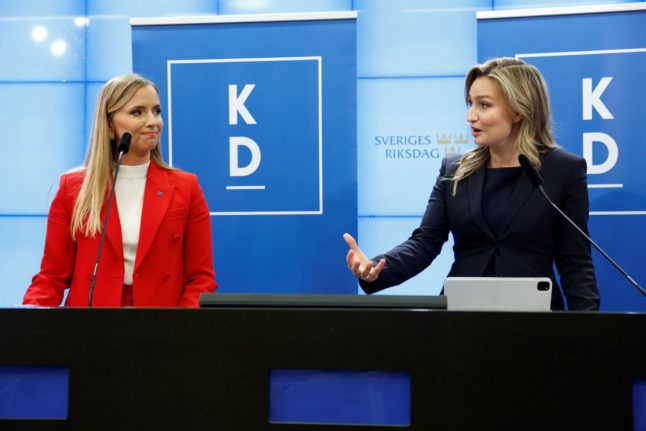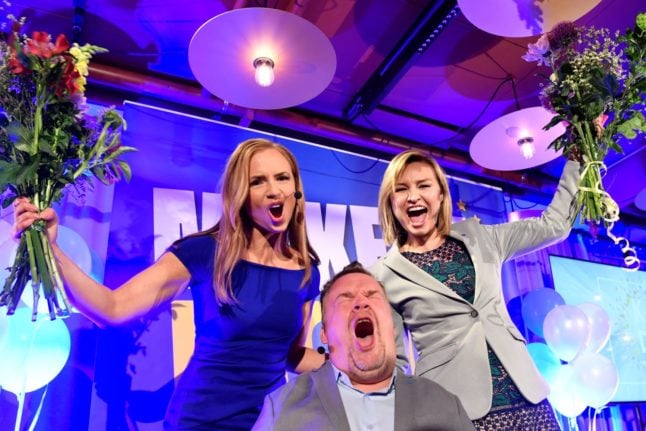On the face of it, the party’s leader, Ebba Busch, and its top MEP, Sara Skyttedal, have much in common: both are skilled political communicators, both have helped drive the party to the populist right, and both are among Sweden’s best-dressed politicians.
But the two are now in the final throes of a battle to the political death.
Skyttedal already looks to have received the fatal blow. The question is whether she will be able to take Busch with her.
“I was confronted with something which only exists in the imagination of Ebba Busch,” Sara Skyttedal claimed in a TV interview last week, a few days after she was abruptly replaced as the party’s top EU candidate on the grounds that she had betrayed her party by opening talks with the rival Sweden Democrats.
In the interview, she painted an unflattering picture of the internal dynamics in the Christian Democrats, particularly the machinations that led to her dismissal, but she also said that the party had not been honest over the controversy of her predecessor in the EU parliament and his views on abortion.
“Flexibility with the truth seems to be the common thread running through all this,” Skyttedal said.
Busch and others in the party probably breathed a sigh of relief that she had nothing more damaging to air.
The saga goes back to the start of last year, when Skyttedal — a former leader of the Christian Democrats’ youth wing — horrified party traditionalists by arguing for the legalisation of medical cannabis in an article in the Dagens Nyheter newspaper, even going so far as to admit that she herself had used it (with the caveat that this was in countries where usage is legal).
When Johan Ingerö — the party secretary who was arguably the architect of the party’s shift to the populist right — gave her a dressing down and pressured her to publicly retract what she’d said, she responded by reporting him to the police for sexually harassing her at a post-election party nine years previously.
Busch removed Ingerö in March, justifying the move with the claim that he had not been successful as party secretary anyway.
The punishment for Skyttedal didn’t come until two months later, when the party’s nomination committee dropped her as the lead candidate in the European elections, replacing her with David Lega, who represents the party’s more conservative religious wing. Another candidate, Ella Kardemark, was put in second place.
Skyttedal is not someone who can be so easily discounted, however. She immediately began canvassing within the party, winning the backing of its youth wing and other powerful figures.
At the party’s annual congress last November, she then made a dramatic arrival, preceding to win back the top spot by securing a majority on the party committee.
At this point, it looked like Skyttedal had come out victorious.
But on January 20th, Busch called a press conference at which she announced a new twist that took even the most avid party-watchers by surprise. Skyttedal would be removed and replaced, not by Lega, but by someone who had only joined the party the day before: the right-wing journalist Alice Teodorescu Måwe.
In her favour, Teodorescu Måwe has a strong public profile which has only grown over recent months since she began jointly fronting a new politics show on Swedish national TV, alongside the left-wing Social Democrat Daniel Suhonen.
On the other hand, she is so close to the Moderate Party that she even helped develop their ideas programme and, after her candidacy for the Christian Democrats was announced, admitted in an interview with TV4 that she didn’t even believe in God.
At a press conference announcing her replacement, Busch said that Skyttedal had betrayed the Christian Democrats by approaching the Sweden Democrats, claiming that she had gone as far as to ask if she could switch parties and instead be placed at, or near, the top of the Sweden Democrats’ party list in the European elections.
Busch said she’d been alerted to Skyttedal’s machinations by none other than the Sweden Democrats’ party leader, Jimmie Åkesson.
But this information came to light in the autumn, before Skyttedal had even won the backing of the party’s ruling committee, meaning Skyttedal can probably justly claim that this was largely just a pretext for removing her once a suitable candidate had been found.
In her interview, she admitted to contacting the Sweden Democrats, but claimed she had simply floated the idea of helping them out as a consultant. “I absolutely did not demand anything like that,” she said of the claim she had wanted to top their party list. “I didn’t get any offer of that either.”
“My view is that I have been crystal clear with how these contacts have looked long before it became a problem. In my view, Ebba Busch has not been honest with me about her intentions,” Skyttedal said.
So what will the next twist in this drama bring?
Whatever happens, the image of the Christian Democrats is badly tarnished.
Under Busch’s predecessor, the gentle Göran Hägglund, the Christian Democrats were the party of traditional family values and generous international aid. Since Busch took over, they’ve started to resemble the Christian right in the US, a change that has already divided the party’s rank and file.
Internally, the party is also unhappy that a complete newcomer has been appointed to a plum position over politicians who have dedicated their lives to the party.
“I’m not going to campaign to send a Moderate party opinion-maker to Brussels.” Magnus Kolsjö, a Christian Democrat who has himself formerly campaigned to be an MEP, wrote on Facebook, calling the move “totally brain dead”.
It may be that Busch is calculating that Teodorescu Måwe can win over just enough former Moderate voters to secure the party’s two MEPs in the European election in June. But the decision is arguably more likely to just stop loyal supporters bothering to vote.
If that happens, and the party loses one of more of its two MEPs, Busch is likely to get the blame. It could even trigger a change of leader.
It may be, however, that Skyttedal manages to land another damaging blow before that.







 Please whitelist us to continue reading.
Please whitelist us to continue reading.
Member comments